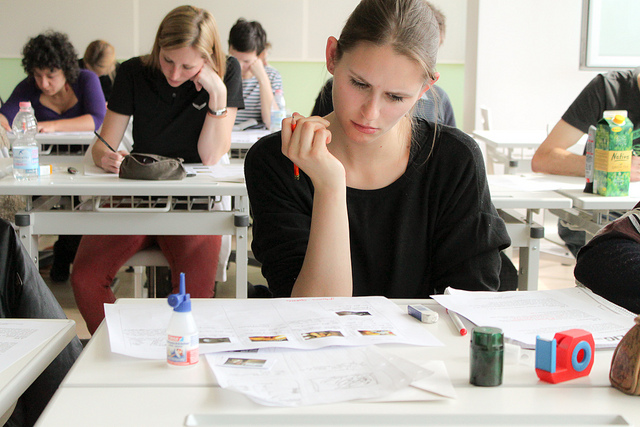
(Image credit: zeligfilm)
If you are using formative assessment to help guide your instruction and give feedback to your students, then you should be able to fairly easily predict how well your students will do on a classroom test. If you can, why are you giving your students the test?
Hopefully your answer isn’t "so they will have experience in a testing situation for later in life." To be clear, I still use classroom tests, but I am beginning to question the practice.
Can someone give me a better argument for classroom tests?
Sue Jones says:
I don’t know how different your formative assessments are from a “test.”
A really well made test teaches. I haven’t had too many of ’em… but when they ask me to make connections between things I’ve learned, I get insights I wouldn’t have had dealing iwth things one at a time.
I also pay more attention to a test… so I’m more likely to switch something over to long-term memory…
In math, I tell students that the practice with support is like singing along to the radio, while the math test is the solo performance and deserves preparation and focus.
December 21, 2012 — 2:29 pm
David Wees says:
That’s a reasonable argument. I’ll accept that well-made tests are teaching/learning tools.
Now, could you create a test-like assignment that did the same thing? Is the pressure of the test situation necessary?
December 21, 2012 — 2:39 pm
Tim Frodsham says:
I agree that tests can be motivators. A lot of the insight I gained in my own math classes was while studying for a test. In this era of standardized curricula, tests will always be with us and as you suggest, with careful preparation and appropriate attitudes, we can make them something positive.
December 30, 2012 — 11:40 pm
Chris Wejr says:
I guess it also depends on how we define a test? Small quizzes to give a snapshot of where a child is at without coaching and support can be an effective part of the assessment toolbox. As much as I am all about formative… I think we too often toss out the summative when there is still some value.
December 21, 2012 — 3:33 pm
Jennifer says:
I agree it’s how we define test – and what we consider to be summative assessments. Formative assessment may be an indication of student mastery but that’s not always the case. I agree with Sue – FA are the rehearsals, the summative assessment is opening night.
December 21, 2012 — 4:07 pm
David Wees says:
Does a summative assessment need to be a test? Could we not get similar information another way?
December 21, 2012 — 4:17 pm
Tim Frodsham says:
Standardized tests tend to focus on the memorization aspects of mathematics. Students need a thorough understanding of the tools of math, the rules and concepts, and learning these to the point of second nature takes repetition. Quizzes and other exercises help here if administered properly. According to Robert Gagne, the highest form of thinking is problem solving, which is learned through active participation, not passive learning. Problem solving is to wrap ones self around an interesting application, then using the tools of mathematics to increase understanding and find solutions. It takes initiative and creativity and the stifled, tension ridden atmosphere of an exam is not the ideal place for students to demonstrate their problem solving skills.
Math and test anxiety are constant issues, particularly among the adult learners I teach at the community college. If requested, I allow students to take an exam in the resource center, where there are no looming time limits and the atmosphere is less pressured. I allow students to ask questions about the exam, have given exams orally to anxiety challenged students, and in one situation, allowed two math anxious students to take the exam together, so they could talk through the anxieties while working the problems.
Because tests are limited in showing true problem solving skills, and many students are struggling with learning anxieties and have issues with tests, I am reducing the focus on exams in my classroom, and using formative assessments.
December 30, 2012 — 11:37 pm
Misty says:
I think the quizzes in my class help the students to see where they are at and what they need to work on still. it also gives me a more specific view of what they can do. I have a general idea of where the students are, but might not pick up on the little things I still need to have them work on. Hard to keep close track of 120 students without testing
January 31, 2013 — 10:46 pm
David Wees says:
I see a short quiz as a different experience than a full period test. They are shorter, faster, and we have less expectations that they are a completely accurate measure of student learning. For some reason when we triple the length of a short quiz and call it a test, we somehow think it does a much better job of correlating with their understanding.
February 1, 2013 — 12:50 am